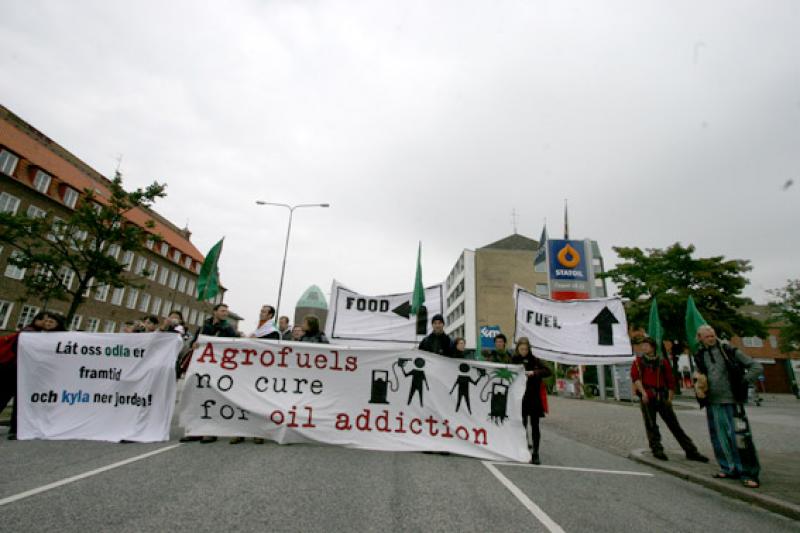
Protesters at petrol stations state "Agrofuels are no solution for the climate and energy problem!"
Some 50 people protested against the introduction of the large scale production of agrofuels at the European Social Forum in Malmo, Sweden, with a demonstration outsdie a petrol station. The devastating social and environmental consequences of the production of energy crops was a big issue in the presentations and discussions inside the ESF. The Agrofools decided that it was important to reach the people in the streets as well, and to explain that we have to choose between food and fuel.
50 people protested against the introduction of the large scale production of agrofuels.
In Front of a Statoil petrol station (Nobelvägan near corner Lönngatan) the traffic was stopped and waiters and waitresses serving organic food talked to the drivers. They had to choose between fuelling their car, or access to food for themselves and other people. There was understanding and sympathy for the alternative, although nobody decided to leave the car at the spot. Luckily the police was occupied by their preparations for the big ESF demonstration. It took them 30 minutes to find out about the action. Just when the activists decided to move on to the next stop, three vans arrived. But just before the groups arrived at the a Shell station (corner Lönngatan and Lantmannagatan) the cops lost interest and left. This gave the group the opportunity to put a line around this unguarded station and leave the message "Closed due to climate change and human rights violations". The action was done by about 50 people from Via Campesina, young Friends of the Earth, A SEED, Corporate Europe Observatory and individual activists.
Background
The European push for agrofuels is going to have many social and environmental implications. Rising food prices jeopardise people´s food sovereignty and access to food. Sweden is one of the EU member states most in favour of using more agrofuels, especially sugarcane ethanol from Brazil. This year, the Swedish government asked the EU to allow imports of sugarcane ethanol from Brazil with lowered trade barriers. Oil companies like Statoil are keen to get a share out of the new agrofuel business. Statoil signed a deal with Brazilian oil company Petrobras aimed at jointly expanding exploration, sub-sea and agrofuel production.
Many other Scandinavian companies are involved on agrofuels. Swedish company SEKAB has started large scale sugarcane production in Tanzania to fuel Swedish cars with ethanol. German newspaper Spiegel reported that thousands of residents are being forced to move to make way for Sekab's plans, on at least 9,000 hectares. Five thousand hectares have already been approved but Sekab wants to expand to 50,000 hectares.
SEKAB will compete with the local population for the water available in the river and wetlands, especially in the dry season. Residents complained about complete lack of information or compensation given. SEKAB pretends to be sourcing 'certified sustainable' ethanol from Brazil, and has established its own criteria for this. However, these sustainability guarantees do nothing to stop the expansion of monoculture plantations in Brazil, with both direct and indirect impacts.
Scandinavian cellulose companies are keen to profit as well, especially from the so-called ´second-generation´ agrofuels. They misleadingly claim that the tree monocultures needed to provide the cellulose will not compete with food production.
Social and ecological consequences of agrofuels (three out of many)
1. Agrofuels are competing with food: The current food crisis is telling. Within a few month, the price of rice has increased with about 100 % and the price of grains by 130% in 2007. One of the effects being food riots in many countries.
2. Large scale production of agrofuels is not environmentally friendly at all: as it extends monocultural cultivation, the use of human and environmentally polluting pesticides, the over-use of the soil, the loss of biodiversity and the use of genetic modification.
3. Small scale farmers loose their land and resources: as large scale agriculture is led by a relatively small number of large scale farmers and foreign companies. With small scale agriculture 40 families could sustain their livelihoods on a surface of 200 hectares. Large scale soja production, however, only needs one labourer for the same acreage.
More info at:
http://www.aseed.net/soy - http://www.regenwald.org - http://www.lasojamata.org - http://viacampesina.org - http://www.biofuelwatch.org
